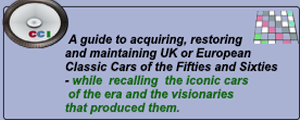
Interest in restoring and maintaining UK and European Classic Cars, and especially those produced during the Fifties and Sixties has never been higher- yet there is nothing new about it.
Enthousiasts have been active for more than Fifty years and in increasing numbers to preserve the heritage of these golden years driven by what is regarded as the four pillars of the classic-car scene: auctions, shows, swap meets (autojumbles), and owners’ meetings. Each of these events offers something different—market knowledge, inspiration, hard-to-find parts, and a community that keeps cars on the road. Classic Car Auctions are known to be the best single place to gain fast, first-hand market intelligence, where in a few hours someone new to the world of classic cars can learn about reserve levels and how condition, history, and originality influence bidding. Watching this scenario play out in person is more educational than weeks of online browsing and where the inexperienced buyer has a much better chance to pick a car whose history and condition are totally transparent. Pre-sale inspection windows allow a potential buyer to examine bodywork, interior, and mechanicals within a reasonable time scale without the pressure of a private seller looking over your shoulder. Classic Car Shows play the role of being a live catalogue of ideas and action, where different owners are solving the same problems that a less experienced person might be experiencing, and where finishes and materials can be compared side-by-side. Finally, and possibly most important, Classic Car Shows provide motivation. Seeing a car finished—and hearing the owner’s timeline, budget, and missteps—reframes any project as achievable. Swap Meets or Autojumbles as they are sometimes known are the nearest thing to a treasure hunt for restorers and maintainers of classic cars. As anyone actively involved in classic car restoration and maintenance will tell you- there is need to be methodical when attending a swap meet, with no little discipline required. The first rule is to arrive early before the crowds arrive and bring as much cash as you feel you will need or can afford so that a valuable part will not go past you. At swap meets cash is still king with many stalls either willing or unable to accept credit card payment. The same rule should always apply if you have something to sell. When appraising an item before purchase, it is important to be realistic about condition—factor in replating, rebuilding (e.g., fuel pumps, wheel cylinders), or core exchange value Autojumbles also teach pricing. That knowledge carries into online buying and helps you negotiate calmly. And don’t ignore the book stalls—original workshop manuals, parts lists, and period sales brochures are research gold and often cheaper in person. Classic Owners Clubs are the backbone of the UK scene. An owners’ meeting is where knowledge moves fastest: which modern tyre sizes best suit original gearing, how to quieten a diff on a Minor, which supplier’s rubber perishes quickly, or how to re-key a glovebox lock to match the ignition. Many clubs maintain spares schemes or remanufacture NLA parts to original drawings; being a member often gives you access to those parts and to trusted specialists for engines, gearboxes, and trim. Regular meets build accountability and momentum for your project. Sharing progress, asking for a second pair of hands to refit a headlining, or borrowing a rare tool (hub puller, kingpin reamer) can save weeks. Clubs often arrange technical days—valve-clearance workshops, carb tuning, electrical fault-finding on loom test rigs—that demystify jobs you might otherwise outsource. Insurance benefits are real too: some brokers offer agreed-value policies and discounts to active club members, and clubs can help compile evidence for valuations. Owners Clubs can also act as advocates. For age-related registrations, DVLA queries, dating certificates, or verification of chassis numbers, a recognised club’s registrar can save administrative dead-ends. And socially, the meets remind you that classics are for driving, not just polishing—runs, hill climbs, track evenings, and charity drives give you goals that keep a car exercised and reliable. Attending UK auctions, shows, autojumbles, and owners’ meetings isn’t just a social event. It’s the smartest way to extract maximum value from free time, reduce the risk of making mistakes, while keeping a classic car in an authentic condition. Auctions tune your sense of value; shows sharpen your eye; autojumbles feed your parts shelves; clubs keep your enthusiasm and knowledge topped up. Invest a few weekends and you’ll feel the difference in your workshop, your wallet, and—most importantly—behind the wheel.Back to the homepage- and don't spare the horsepower.
ae4



